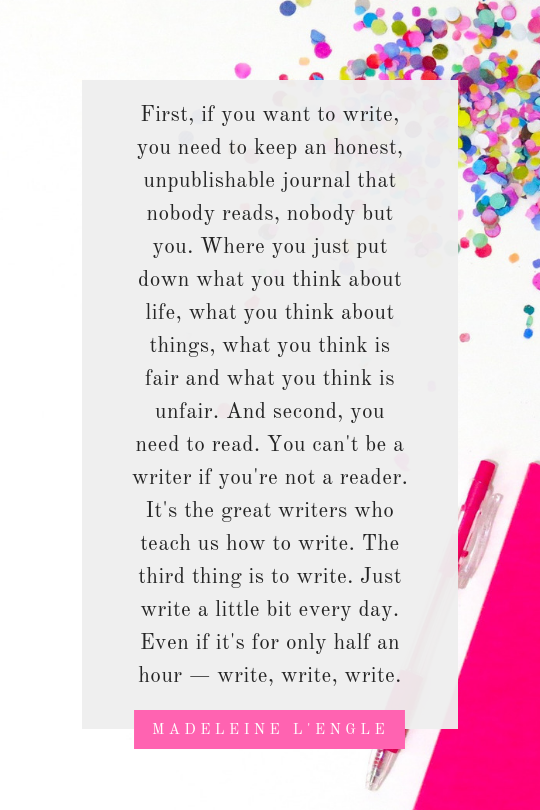Written by Eilish Toohey
Madeleine L'Engle, author of A Wrinkle in Time, once gave the following three pieces of advice for aspiring authors:

L'Engle is one of many authors who recommend daily writing practice, yet it is this piece of advice that tends to turn people away. This is completely understandable. Having to force yourself to write every day sounds tedious, and, if writing practice seems like a chore, you will likely try to avoid doing it.
That said, if you're interested in becoming a better writer, making a habit of writing every day can greatly improve your writing skills.
Make Writing a Habit
Think of writing practice as a form of exercise. If you decided to take up running for the first time or were returning to running after being out of commission for a long period, would you be ready to immediately do a marathon?
Of course not. You would have to train for an extremely long time to strengthen your muscles and improve your stamina. The same goes for writing. If you are no longer in school or have a job that does not involve regular writing tasks, these skills can enter a state of atrophy. Much like our muscles, we need to habitually practice writing so we remain in top condition.
Writing every day does not mean that you need to draft a full-length novel or 51 essays every 24 hours. As impressive as that would be, no one has time to do that. We all have responsibilities throughout the day that take away from our free time—jobs, school, children, dogs, houseplants, pet rocks—but just because you have a busy schedule does not mean that it is impossible to find time to write.
One of Canada's most prolific authors, Alice Munro, managed to start a writing career while simultaneously running a bookstore and raising three children by sticking to short stories. If you can set aside 30 minutes to an hour every day for writing practice (and set yourself a word or page limit to meet), you can become a better writer. You should also aim to schedule your writing practice for the same time every day so it becomes a habit.
Overcoming Obstacles
One reason that people find it difficult to write every day is writer's block. We have all been there. Instead of writing, we distract ourselves with other activities while we wait for inspiration to arrive.
However, daily writing practice is actually the best way to combat writer's block. As Mario Vargas Llosa once said in an interview with The Paris Review:
"If I started to wait for moments of inspiration, I would never finish a book. Inspiration for me comes from a regular effort."
If you're having a hard time with your current project, use your time set aside for writing practice to write lists about odd habits of yours or about people that you see on the street. While these may not immediately spark ideas for your current project, you can always come back to what you wrote later; you never know what interesting ideas might spring forth when you revisit old writing. This is also a good way to help organize your thoughts, which can be another factor that keeps inspiration from flowing.
Conclusion
Writing every day can help you become more aware of the limits of your vocabulary. The more you write, the more obvious that frequent word choices become. Once you know your limitations, you can expand your vocabulary by finding stronger words or experimenting with word order to see if there are other ways to get your message across. In this way, writing practice can help you craft a distinct voice, which is something that every good writer must have, and it can help you on your journey to becoming a better writer.
Get yourself a notebook and set aside an hour every day just to write. Write about strange dreams that you had. Record what happened at work today. Try little writing exercises—Scribendi actually offers free writing prompts, which you can download here. Do not feel discouraged if your initial writing is not great; the whole point of practicing is to steadily improve your skills, which you can only do if you have something to work with. As short story author Katherine Mansfield once said:
"[It is] better far write twaddle or anything, anything, than nothing at all."
Image source: Jes D.A.
Get Constructive Feedback to Improve Your Writing
Hire a Professional Editor, or Get a Free Sample
About the Author
Eilish is an in-house editor at Scribendi and a York University graduate with a BA in Professional and Creative Writing. She enjoys reading magical realism, discovering musical theater trivia, and convincing friends to watch obscure Canadian films. When she is not plotting soundtracks for her many unfinished novels, she can be found wandering off the path during hikes in the woods.









